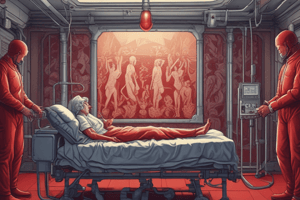Podcast
Questions and Answers
Mutations are heritable changes in the genome that do not result in genotypic variation.
Mutations are heritable changes in the genome that do not result in genotypic variation.
False (B)
Successful mutations are those that do not impart any selective advantage to the organism.
Successful mutations are those that do not impart any selective advantage to the organism.
False (B)
Directed change is the only way mutations can arise according to Luria and Delbrück.
Directed change is the only way mutations can arise according to Luria and Delbrück.
False (B)
The frequency of DNA replication errors in wild type E. coli is approximately $1 imes 10^{-3}$ per genome per generation.
The frequency of DNA replication errors in wild type E. coli is approximately $1 imes 10^{-3}$ per genome per generation.
Signup and view all the answers
Bacterial genetics is highly predictable and follows a linear pattern similar to a small town.
Bacterial genetics is highly predictable and follows a linear pattern similar to a small town.
Signup and view all the answers
Horizontal gene transfer only occurs between bacteria and their host organisms.
Horizontal gene transfer only occurs between bacteria and their host organisms.
Signup and view all the answers
During base substitution, transition occurs when a purine switches to a pyrimidine.
During base substitution, transition occurs when a purine switches to a pyrimidine.
Signup and view all the answers
In frameshift mutations, the wild type reading frame remains the same even if one or more bases are inserted or deleted.
In frameshift mutations, the wild type reading frame remains the same even if one or more bases are inserted or deleted.
Signup and view all the answers
The presence of stop codons like UAA, UAG, and UGA in DNA sequences can lead to nonsense mutations.
The presence of stop codons like UAA, UAG, and UGA in DNA sequences can lead to nonsense mutations.
Signup and view all the answers
A synonymous mutation results in changing the amino acid sequence of a protein.
A synonymous mutation results in changing the amino acid sequence of a protein.
Signup and view all the answers
Genetic rearrangements involve changes in the sequence of nucleotides within a gene.
Genetic rearrangements involve changes in the sequence of nucleotides within a gene.
Signup and view all the answers
Pathogens always cause disease by growing and colonizing in the host organism.
Pathogens always cause disease by growing and colonizing in the host organism.
Signup and view all the answers
In evolution, new genes can only arise de novo without any relation to existing genes.
In evolution, new genes can only arise de novo without any relation to existing genes.
Signup and view all the answers
Horizontal gene transfer is an intrinsic mechanism for the emergence of new genes in bacteria.
Horizontal gene transfer is an intrinsic mechanism for the emergence of new genes in bacteria.
Signup and view all the answers
Gene duplication can lead to the emergence of new functions in proteins due to mutations in the extra copy.
Gene duplication can lead to the emergence of new functions in proteins due to mutations in the extra copy.
Signup and view all the answers
Point mutations have a high likelihood of directly leading to the emergence of new functions.
Point mutations have a high likelihood of directly leading to the emergence of new functions.
Signup and view all the answers
Gene gain and gene loss are part of the process of genome reduction in bacteria.
Gene gain and gene loss are part of the process of genome reduction in bacteria.
Signup and view all the answers
Mutation during non-functionality model suggests that new genes can emerge when an existing gene is duplicated during non-functionality.
Mutation during non-functionality model suggests that new genes can emerge when an existing gene is duplicated during non-functionality.
Signup and view all the answers




